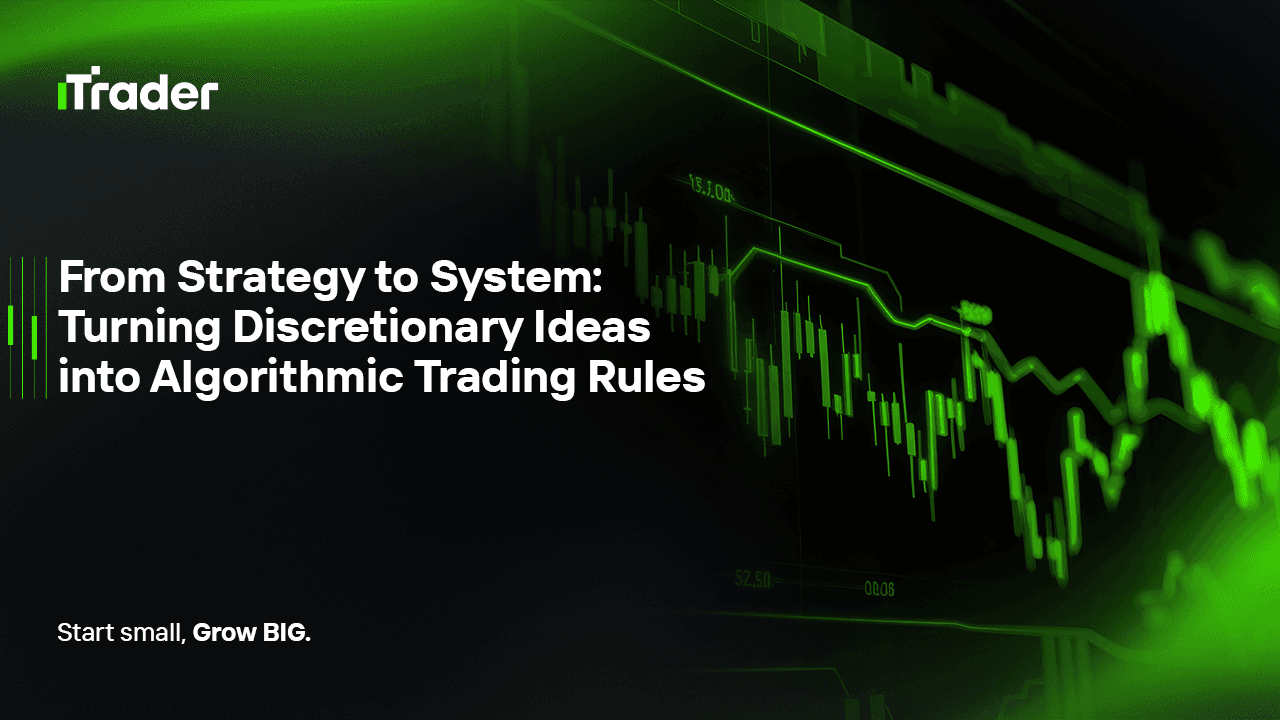2025-09-25
Most traders begin their journey by trading discretionary — relying on their eyes, instincts, and past experience to make decisions in the moment. There’s nothing wrong with that. In fact, many great insights are born from seeing patterns on a chart and trusting your gut.
But there’s a problem. Intuition doesn’t scale. It can’t be backtested. And when pressure mounts — especially under prop firm evaluation rules — emotions creep in, decisions change, and discipline slips.

That’s why serious traders eventually take the step from strategy to system: transforming their discretionary ideas into clear, testable, rule-based frameworks. In this article, we’ll look at how to make that shift, why it matters in the prop trading world, and what tools you can use to bring your trading to the next level.
Discretionary trading means you’re calling the shots in real time. You spot a pattern, read price action, maybe factor in the news, and decide: “This looks like a good entry.”
Systematic trading, on the other hand, is built on rules. Every trade follows predefined conditions, which means the strategy can be tested, measured, and even automated.
For prop firm traders, systematic approaches are a necessity. Firms don’t just care about making money — they care about risk control, discipline, and repeatability. A system gives you all three.
Every discretionary decision has hidden logic behind it. Maybe you saw price “reject” a level. Maybe you noticed momentum fading before a breakout. The key is to translate those observations into conditions that can be measured.
Example:
It’s the same insight — but expressed in a way that can be tested, repeated, and tracked.
To turn an idea into a system, think in components:
Each rule removes uncertainty and brings structure to your trading.
Once your rules are clear, they need proof.
A system isn’t proven until it survives both.
Not every trader wants to hand over all decisions to an algorithm. That’s fine. Many successful prop traders use hybrid systems:
This balance keeps discipline in place while still allowing for human judgment when it matters most.
Prop firms are strict about rules: daily loss limits, maximum drawdowns, position sizing caps. Without a system, it’s easy to break those rules accidentally. With one, you stay in line by default.
More importantly, systems deliver what prop firms value:
Turning ideas into systems is easier than ever:
You don’t need to be a programmer to start. Even partial rule-building makes your trading more disciplined.
Moving from discretionary trading to rule-based systems isn’t about losing creativity — it’s about bottling your insights into something repeatable.
The steps are simple:
The truth is this: good traders rely on instinct, but great traders systematize their instincts into rules that work under pressure. That’s the difference between passing a prop firm challenge and building a career in trading.
© 2025 iTrader Global Limited|会社登録番号:15962
iTrader Global Limitedは、コモロ連合のアンジュアン自治島ムツァムドゥのHamchakoに所在し、コモロ証券委員会によって認可・規制を受けています。ライセンス番号は L15962/ITGL です。
iTrader Global Limitedは「iTrader」の商号で運営しており、外国為替取引業務を行う許可を受けています。会社のロゴ、商標、ウェブサイトはすべて iTrader Global Limited の専有財産です。
iTrader Global Limitedの他の子会社には、iTrader Global Pty Ltd(オーストラリア会社登録番号(ACN):686 857 198)が含まれます。 この会社は、Opheleo Holdings Pty Ltd(オーストラリア金融サービスライセンス(AFSL)番号:000224485)の認可を受けた代表者(AFS代表番号:001315037)です。登録住所は Level 1, 256 Rundle St, Adelaide, SA 5000 です。
免責事項: この法人は、本ウェブサイト上で取引される金融商品の発行者ではなく、それらに対して責任を負いません。
リスク警告: 差金決済取引(CFD)は、レバレッジにより資本の急速な損失リスクが高く、すべての利用者に適しているとは限りません。
ファンド、CFD、その他の高レバレッジ商品を取引するには、専門的な知識が必要です。
調査によると、84.01%のレバレッジ取引者が損失を被っています。取引を開始する前に、リスクを十分に理解し、資金を失う可能性があることを認識してください。
iTraderは、レバレッジ取引によるリスク、損失、またはその他の損害について、個人または法人に対して一切の責任を負わないことを明言します。
利用制限: iTraderは、法律、規制、または政策によりこのような活動が禁止されている国の居住者を対象として、本ウェブサイトやサービスを提供していません。